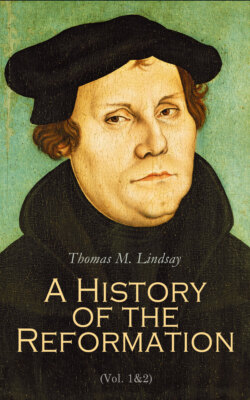Читать книгу A History of the Reformation (Vol. 1&2) - Thomas M. Lindsay - Страница 16
На сайте Литреса книга снята с продажи.
§ 6. Germany and Italy.
ОглавлениеTable of Contents
Germany and Italy, in the beginning of the sixteenth century, had made almost no progress in becoming united and compact nations. The process of national consolidation, which was a feature of the times, displayed itself in these lands in the creation of compact principalities rather than in a great and effective national movement under one sovereign power. It is a commonplace of history to say that the main reason for this was the presence within these two lands of the Pope and the Emperor, the twin powers of the earlier mediæval ideal of a dual government, at once civil and ecclesiastical. Machiavelli expressed the common idea in his clear and strenuous fashion. He says that the Italians owe it to Rome that they are divided into factions and not united as were Spain and France. The Pope, he explains, who claimed temporal as well as spiritual jurisdiction, though not strong enough to rule all Italy by himself, was powerful enough to prevent any other Italian dynasty from taking his place. Whenever he saw any Italian power growing strong enough to have a future before it, he invited the aid of some foreign potentate, thus making Italy a prey to continual invasions. The shadowy lordship of the Pope was sufficient, in the opinion of Machiavelli, to prevent any real lordship under a native dynasty within the Italian peninsula. In Germany there was a similar impotency. The German king was the Emperor, the mediæval head of the Holy Roman Empire, the “king of the Romans.” Some idea of what underlay the thought and its expression may be had when one reads across Albert Dürer's portrait of Maximilian, “Imperator Cæsar Divus Maximilianus Pius Felix Augustus,” just as if he had been Trajan or Constantine. The phrase carries us back to the times when the Teutonic tribes swept down on the Roman possessions in Western Europe and took possession of them. They were barbarians with an unalterable reverence for the wider civilisation of the great Empire which they had conquered. They crept into the shell of the great Empire and tried to assimilate its jurisprudence and its religion. Hence it came to pass, in the earlier Middle Ages, as Mr. Freeman says, “The two great powers in Western Europe were the Church and the Empire, and the centre of each, in imagination at least, was Rome. Both of these went on through the settlements of the German nations, and both in a manner drew new powers from the change of things. Men believed more than ever that Rome was the lawful and natural centre of the world. For it was held that there were of divine right two Vicars of God upon earth, the Roman Emperor, His Vicar in temporal things, and the Roman Bishop, His Vicar in spiritual things. This belief did not interfere with the existence either of separate commonwealths, principalities, or of national Churches. But it was held that the Roman Emperor, who was the Lord of the World, was of right the head of all temporal States, and the Roman Bishop, the Pope, was the head of all the Churches.” This idea was a devout imagination, and was never actually and fully expressed in fact. No Eastern nation or Church ever agreed with it; and the temporal lordship of the Emperors was never completely acknowledged even in the West. Still it ruled in men's minds with all the force of an ideal. As the modern nations of Europe came gradually into being, the real headship of the Emperor became more and more shadowy. But both headships could prevent the national consolidation of the countries, Germany and Italy, in which the possessors dwelt. All this is, as has been said, a commonplace of history, and, like all commonplaces, it contains a great deal of truth. Still it may be questioned whether the mediæval idea was solely responsible for the disintegration of either Germany or Italy in the sixteenth century. A careful study of the conditions of things in both countries makes us see that many causes were at work besides the mediæval idea—conditions geographical, social, and historical. Whatever the causes, the disintegration of these two lands was in marked contrast to the consolidation of the three other nations.
